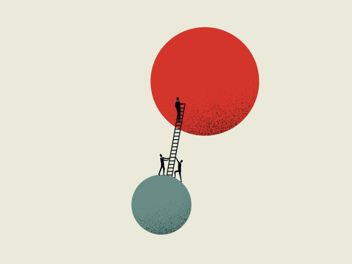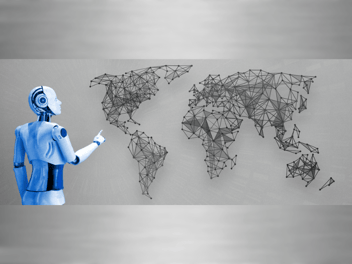
In recent weeks we have been writing a lot about customer expectations, transparency and authenticity. We have been looking at ways in which business leaders and marketing experts need to work together to ensure the values companies lay claim to are reflected across their organisations.
This week we spoke to Edgar Penollar, CEO of The Hygiene Bank, which seeks to provide support for those experiencing hygiene poverty across the UK. We spoke about the work that’s being done to address the immediate crisis, and how encouraging business leaders to reflect upon their own role in systemic change can have a much greater impact on working towards a long-term resolution.
What is The Hygiene Bank?
The Hygiene Bank is a charity that’s only about three years old. It began when founder, Lizzy Hall, who was named one of The Big Issue’s Changemakers in 2019, watched Ken Loach’s I, Daniel Blake for the first time. She was struck by the scene in which a single mum is caught shoplifting razors, deodorants and sanitary pads, having not been able to get them from the local food bank. When she spoke to a food bank near her and asked if this scenario was a reality, she was told it was.
She discovered that long before someone goes to a food bank, they stop purchasing hygiene products. Those swept into poverty face impossible choices each day between feeding themselves and their families or keeping clean. She started by asking for donations on social media, and soon enough, Hygiene Banks were popping up all over the UK. Today there are more than 150 ‘projects’ around the UK, all are run by volunteers and all focus on the local community. If you give locally, it helps locally.
How does it work?
We have over 820 drop-off locations across the UK, and thanks to our strategic partnership with Boots, 400 of those locations are in their stores. People can donate products ranging from toothpaste to nappies, deodorant to period products - as long as they are new, unused and unopened.
Then volunteers distribute the donations to community partners like food banks, schools and homeless shelters. We work with more than 2,000 community partners at the moment, and we have a long waiting list as well.
We give donations to these frontline organisations in addition to the important services they provide. We don’t focus on one demographic, we support everyone from babies to elderly people - anyone in crisis and in need.
Our donations come from individuals, and we also engage with a number of brands like Boots, Unilever and Pampers, who give us products our volunteers help distribute around the UK.
What is the scale of the need when it comes to hygiene products?
To provide some context, in 2019, when we began, we distributed £270,000 worth of products and in 2020, we distributed seven times that (£3.5m worth).
The demand for what we do is on the increase, and with the pandemic, the universal credit uplift being withdrawn, higher energy prices, and the expectation of inflation on food bills, there’s more and more pressure on household income. We know families who are working two or three jobs and are still struggling to keep their heads above water.
One of the things we talk about is how all it takes is one event; someone loses their job or has an accident or a bereavement, and everything spirals. We knew a young man in his late teens whose mum passed away. The impact on that child at that formative stage was phenomenal. He ended up falling out with his father and living out of his car. That one event pushed him further into poverty. As a community, we need to really think it’s about helping people - we don’t always know what their story is or why that person ended up in that situation.
One of the other drivers of hygiene poverty is when someone in the family is disabled. That might mean someone has to be at home the whole time and therefore can’t work. With zero-hour contracts and minimum wage, it’s just not enough to survive.
Boots did a back-to-school campaign this year and surveyed 500 teachers, 70% of whom agree hygiene poverty is a problem in schools and have personally observed poor hygiene as a result of poverty.. In addition to the physical health impact, hygiene poverty can lead to bullying, poor mental health, an inability to concentrate and learn, which can have a long-term effect. We can also see the impact of hygiene poverty on the NHS. It’s estimated that about £30m is spent on tooth extraction for children because of poor dental hygiene.
We have to ask ourselves, how can we have this situation in our communities?
Why do you think you’ve had such a strong reaction to The Hygiene Bank?
Hygiene poverty and how it comes about is something that really resonates with people. We run a National Hygiene Week each year to help raise awareness about this hidden crisis. This year we commissioned research that suggests one in five people know of someone who’s experienced hygiene poverty. Around 37% of those who responded had experienced it themselves in the past year.
We have a lot more to do in order to raise awareness, and we’re very careful with our marketing and communications. It’s important to us to point out how easy it is to fall into poverty, that it isn’t a choice, and that, of course, if you can’t afford to eat, then you can’t afford to keep clean.
How do you use marketing expertise and communications?
We are constantly learning and improving our marketing expertise and communications. There is a stigma associated with hygiene poverty and understandably, people often don’t want to talk about it. That makes the conversation really difficult.
Even from a community partner standpoint, who have a direct relationship with individuals, it’s challenging to discuss. However, when they can help, the knock-on effect is transformative for the individual. Food banks are approaching it by simply including what they think people will need in weekly parcels, so people don’t have to ask for things.
We’re also very careful not to talk about choice; it’s the reality of the situation for many people.
We have moved away from using the word ‘dignity’ too. We used to talk about ‘giving the gift of dignity’, but we realised that’s highly presumptuous of us. If someone is working three jobs to look after their family, that’s a dignified life. So language is incredibly important, but we’re a young charity and we’re still learning.
How can business leaders help?
The first thing for us is about raising awareness. Brands are helping us to do that - to have the conversation. They also help in terms of product donations - giving items and inspiring the public to donate. Some corporations also give monetary donations or have platforms where their customers can give products or money when they buy or use their services.
Behind closed doors it’s also about getting businesses to look at what they can do internally:
- To make sure they are providing a fair wage
- To check in with their teams and make sure they are ok
Do they know how many of their own staff are living in poverty? We want to work with them to shape a better future. These are the things that help to make systemic changes to help prevent people from falling into poverty or to help them to get out of it.
Is it possible to resolve the issue? Poverty has been around forever, but it’s about incremental change and post-pandemic, there’s more of an appetite to change. The reaction from corporations has been positive so far. CSR used to be something organisations paid lip service to, but now companies have staff and consumers who really challenge them to do good - you see that with the reaction to the recent COP26 summit.
If you would like to find out how you and your company can support The Hygiene Bank, you can find out more here.
Reflecting on how your company reflects its values across different levels of the organisation is integral to its reputation. Keeping those two elements aligned is an ongoing process, which you may find benefits from the input of an external marketing expert or interim marketing director. They can provide an outside perspective and also provide a strategic framework for the year ahead, allowing your existing team to continue with the daily running of the organisation and to then implement actionable points. If you would like to find out how gigCMO’s fractional CMO solution may be able to provide this level of support, contact us any time.




